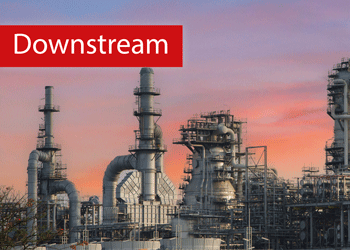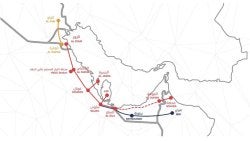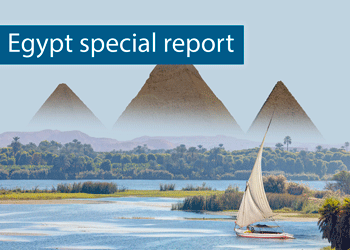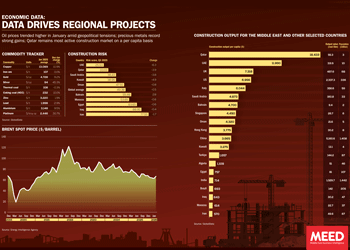Saudi water projects momentum holds steady
12 September 2023
 This package on Saudi Arabia’s water sector also includes:
This package on Saudi Arabia’s water sector also includes:
> Riyadh holds water pipeline bid clarifications
> Red Sea awards Amaala utility package
> Five banks agree $545m Rabigh 4 financing
> Saudi Arabia extends desalination bid deadline
> Albawani joins Jafurah water developer team
> Saudi Arabia evaluates Al-Haer wastewater bids

The Saudi water market remains the region’s largest, with $30bn-worth of projects in varying planning and procurement stages.
The sector is expected to expand further with multibillion-dollar capital expenditures allocated by the potable water and wastewater collection and treatment firm, the National Water Company (NWC), and Saline Water Conversion Corporation (SWCC), the world’s largest producer of desalinated water.
This offers great opportunities for water asset developers and engineering, procurement and construction (EPC) contractors aiming to capture a share of the kingdom’s burgeoning water projects market.
SWCC, NWC and the principal buyer of water, Saudi Water Partnership Company (SWPC), awarded over $32bn of water infrastructure and utility projects between 2013 and 2022, according to MEED Projects data.
Driving investment within the sector is the need to improve water security, a key component of Saudi Vision 2030, along with rising demand due to population and economic expansion.
Reducing the carbon footprint of the kingdom's existing seawater desalination fleet, dominated by plants running on older technologies, is also contributing to the urgency to build more energy-efficient water infrastructure.
This is matched by moves to make potable and wastewater water transmission and distribution more efficient and to minimise leakage and non-revenue water. The kingdom also needs to expand its overall water storage capacity to improve its emergency response.
Simultaneously, like most of its groundwater-scarce neighbours, there is growing pressure to adopt treated sewage effluent for agricultural and industrial applications to reduce demand for seawater desalination and comply with the kingdom’s circular carbon economy approach.
“It is an interesting time for the Saudi water sector,” says a Dubai-based water expert.
“There are many projects in the tendering phase, but there is also some degree of uncertainty in terms of how the roles of the key stakeholders could shift [in the future].”
This stems from the years-long restructuring of the sector and last year's cabinet resolution approving the transfer of water production, transportation and storage assets owned directly or indirectly by SWCC to Water Solutions Company, a wholly-owned subsidiary of the Saudi sovereign vehicle, the Public Investment Fund (PIF).
There is widespread expectation that SWCC will focus on research and development following the transfer of its assets to the PIF subsidiary, although this has not been formally announced.
Diversified clients
The lengthy restructuring of the kingdom’s water sector and rapid advance of so-called gigaprojects have diversified the profile of clients in the kingdom.
Neom and its subsidiary Enowa, SWCC transmission arm Water Transmission & Technologies Company (WTTCo) and other gigaproject developers, such as the royal commissions for Riyadh City and Al-Ula, have joined the mainstream water utility companies and municipalities in tendering new water infrastructure contracts over the past year.
In terms of projects in the pre-execution phase, SWPC is the top client, with a pipeline of projects worth at least $7bn.
SWPC is mandated to procure all water infrastructure projects in the kingdom on a public-private partnership (PPP) basis, including water desalination, wastewater treatment, transmission and reservoirs.
Its latest Seven-Year Planning Statement covering 2022-28 stipulates the procurement of about 50 independent water infrastructure projects, including several in the bid stage.
SWPC’s future projects pipeline outperforms that of NWC and SWCC. Neom, Enowa, WTTCo and the Royal Commission for Al-Ula round out the top seven clients.
 Riyadh rides power projects surge
Riyadh rides power projects surge
Independent projects
Following consecutive awards of independent water producer (IWP) and independent sewage treatment plant (ISTP) contracts between 2019 and 2021, SWPC has recently paced out the award of new contracts.
It has only awarded one contract, directly negotiated with Saudi utility developer Acwa Power for the Shuaiba 3 seawater reverse osmosis (SWRO) project in 2022. This year, it awarded another contract for the Rabigh 4 IWP scheme, in addition to the contract to develop the kingdom’s first independent water transmission pipeline, which connects Rayis and Rabigh.
SWPC is evaluating the bids it received for the contract to develop the Al-Haer independent sewage treatment plant (ISTP), the first of the round-three projects under its ISTP programme, and expects to receive bids in October for the 300,000 cubic-metre-a-day (cm/d) Ras Mohaisen IWP.
The contract to develop the kingdom’s first independent strategic water reservoir (ISWR) project is expected to be awarded this year. The Juranah ISWR has a capacity to store 2.5 million cubic metres of water. The project is anticipated to significantly boost water security, particularly in Mecca and Medina, which host several million pilgrims annually.
EPC works
Despite moves to transfer its assets to the PIF subsidiary, SWCC cemented its reputation as the world’s largest producer of desalinated water when its fleet of 30 desalination plants reached a total combined capacity of 6.6 million cm/d in 2022.
The company is not resting on its past success, having issued successive tenders for SWRO plants using an EPC model over the past 12-18 months.
In July this year, it invited bids for the contract to build a 200,000 cm/d SWRO facility in Ras al-Khair.
This came three months after it received two bids for the contract to build the second phase of the Shuaibah water desalination plant, which has an even higher capacity of 545,000 cm/d.
Around the same time in March, SWCC tendered a contract to construct a greenfield SWRO plant in Yanbu with a design capacity of 500,000 cm/d.
SWPC last awarded a major SWRO contract in mid-2021. The giant 1 million cm/d Jubail SWRO plant is being built by a team of Metito and local firm Saudi Services for Electromechanic Works.
Before this, in late 2019, it awarded a contract to construct a 400,000 cm/d SWRO plant in Shuqaiq to a team of Spain’s Acciona and Al-Rashid Trading & Contracting Company.
SWCC, though WTTCo, has also tendered multiple water transmission projects, including pipelines around Riyadh and connecting Riyadh and Ras al-Khair, Shuqaiq and Jizan and Al-Duwadimi and Atif.
In its 2022 annual report, SWCC stated that it had achieved exceptional results in supporting the Saudi Green Initiative, reducing carbon emissions, increasing operational efficiency to above 99 per cent and saving SR1.6bn ($427m) in operational costs.
The company also “increased local content in its operational efficiency by 61 per cent and demonstrated noteworthy patent accomplishments, innovations, studies and scientific publications”.
Innovation
New tourism-related developments, the expansion of industrial complexes and the need to limit carbon emissions are driving capacity-building and innovation.
The Red Sea development is completing the kingdom’s first private sector multi-utility project, which includes developing and operating a solar photovoltaic power plant, battery energy storage system, water desalination and treatment and waste recycling plants in one contract.
In addition to tendering major water transmission and distribution networks, Neom is also finalising the design for a zero-liquid discharge SWRO plant catering to the development. Enowa, Japan’s Itochu and France’s Veolia are expected to tender the project's EPC package soon.
The proposed state-of-the-art desalination plant will be powered 100 per cent by renewable energy and use advanced membrane technology to produce separate brine streams.
This will enable the production of brine-derived products, which will be developed and monetised downstream. The bigger plan includes establishing a brine processing complex in Oxagon, which could require an investment of between $15bn and $20bn.
Exclusive from Meed
-
 Chemicals producers look to cut spending
Chemicals producers look to cut spending27 February 2026
-
 Qatar takes a quantum leap in fulfilling LNG ambitions
Qatar takes a quantum leap in fulfilling LNG ambitions26 February 2026
-
 Contractor appointed for UAE-Saudi power grid interconnection
Contractor appointed for UAE-Saudi power grid interconnection26 February 2026
-
 Egypt’s crisis mode gives way to cautious revival
Egypt’s crisis mode gives way to cautious revival26 February 2026
-
 February 2026: Data drives regional projects
February 2026: Data drives regional projects26 February 2026
All of this is only 1% of what MEED.com has to offer
Subscribe now and unlock all the 153,671 articles on MEED.com
- All the latest news, data, and market intelligence across MENA at your fingerprints
- First-hand updates and inside information on projects, clients and competitors that matter to you
- 20 years' archive of information, data, and news for you to access at your convenience
- Strategize to succeed and minimise risks with timely analysis of current and future market trends

Related Articles
-
 Chemicals producers look to cut spending
Chemicals producers look to cut spending27 February 2026

Following significant capital expenditure (capex) on petrochemicals and specialty chemicals projects in the first half of this decade, chemicals producers in the Middle East and North Africa (Mena) region are expected to reduce spending in 2026 – and perhaps beyond.
Two primary factors are understood to be behind this anticipated drop. With the bulk of their projects under execution and on course to enter operations between now and the end of the decade, both state-owned and private chemicals producers appear to be set to achieve their short- to mid-term capacity expansion goals.
Also, with subdued global petrochemicals and chemicals demand putting sales margins under pressure, regional players are looking to rein in spending in order to remain profitable.
Steady spending
 An estimated $71bn-worth of petrochemicals and specialty chemicals projects are in the engineering, procurement and construction (EPC) stage in the Mena region, with main contracts for the majority of these projects having been awarded in 2020-25, according to data from regional project tracker MEED Projects.
An estimated $71bn-worth of petrochemicals and specialty chemicals projects are in the engineering, procurement and construction (EPC) stage in the Mena region, with main contracts for the majority of these projects having been awarded in 2020-25, according to data from regional project tracker MEED Projects.The biggest chemicals project under EPC execution is the $11bn Amiral project in Saudi Arabia, which represents the expansion of Saudi Aramco Total Refining & Petrochemical Company (Satorp) in the petrochemicals sector.
Satorp, in which Saudi Aramco and France’s TotalEnergies hold 62.5% and 37.5% stakes, respectively, operates a crude refinery complex in Jubail that has the capacity to process 465,000 barrels a day (b/d) of Aramco’s Arabian Heavy crude oil grade to produce refined products such as diesel, jet fuel, gasoline, liquefied petroleum gas, benzene, paraxylene, propylene, coke and sulphur.
Integrated with the existing Satorp refinery in Jubail, the Amiral petrochemicals complex will house one of the largest mixed-load steam crackers in the Gulf, with the capacity to produce 1.65 million tonnes a year (t/y) of ethylene and other industrial gases.
This expansion is expected to attract more than $4bn in additional investment in industrial sectors including carbon fibres, lubricants, drilling fluids, detergents, food additives, automotive parts and tyres.
Another large-scale project under execution is the Al-Faw integrated refinery and petrochemicals project in Iraq. State-owned Southern Refineries Company brought on board China National Chemical Engineering Company in May 2024 to develop the estimated $8bn project.
The Al-Faw project is being implemented in two stages. The first phase involves developing a refinery with a capacity of 300,000 b/d and will produce oil derivatives for both domestic and international markets. The second phase relates to building a petrochemicals complex with a capacity of 3 million t/y.
EPC works are also progressing on the estimated $6bn Ras Laffan petrochemicals complex in Qatar, which will have the largest ethane cracker in the Middle East. The project is being developed by a joint venture (JV) of QatarEnergy and US-based Chevron Phillips Chemical (CPChem). QatarEnergy owns a majority 70% stake in the JV while CPChem holds the remaining 30%.
The Ras Laffan petrochemicals complex is expected to begin production this year. It consists of an ethane cracker with a capacity of 2.1 million t/y of ethylene. This will raise Qatar’s ethylene production potential by nearly 70%.
The complex includes two polyethylene trains with a combined output of 1.68 million t/y of high-density polyethylene polymer products, raising Qatar’s overall petrochemicals production capacity by 82% to almost 14 million t/y.
A JV of South Korean contractor Samsung Engineering and CTCI of Taiwan was awarded the EPC contract for the ethylene plant, which is understood to be valued at $3.5bn. The EPC contract for the polyethylene plant was awarded to Italian contractor Maire Tecnimont, which said the value of its contract was $1.3bn.
Decisive period
More than $61bn-worth of petrochemicals and specialty chemicals projects are in pre-execution stages in the Mena region, according to MEED Projects, although contracts for less than a quarter of these schemes are set to be awarded in 2026.
 The largest capex programme in the regional chemicals sector that is expected to make progress this year is Saudi Arabia’s liquids-to-chemicals programme, the aim of which is to attain a conversion rate of 4 million b/d of Aramco’s crude oil production into high-value chemicals.
The largest capex programme in the regional chemicals sector that is expected to make progress this year is Saudi Arabia’s liquids-to-chemicals programme, the aim of which is to attain a conversion rate of 4 million b/d of Aramco’s crude oil production into high-value chemicals.Aramco has divided its liquids-to-chemicals programme into four main projects. The company has signed JV investment agreements with foreign partners this year for the four projects, which involve:
> Converting the Saudi Aramco Jubail Refinery Company (Sasref) complex in Jubail into an integrated refinery and petrochemicals complex with the addition of a mixed-feed cracker. The project also involves building an ethane cracker that will draw feedstock from the Sasref refinery. Front-end engineering and design (feed) work on the project is under way and is being performed by Samsung E&A.
> Converting the Yanbu Aramco Sinopec Refining Company (Yasref) complex into an integrated refinery and petrochemicals complex with the addition of a mixed-feed cracker. China’s Sinopec is a JV partner in this project.
> Converting the Saudi Aramco Mobil Refinery Company (Samref) complex in Yanbu into an integrated refinery and petrochemicals complex with the addition of a mixed-feed cracker. US oil and gas producer ExxonMobil, Aramco and Samref signed a JV framework agreement in December to begin preliminary feed work on the project.
> Building a crude oil-to-chemicals complex in Ras Al-Khair in the kingdom’s Eastern Province. Progress on this project has been slow.
Separately, Aramco subsidiary Saudi Basic Industries Corporation (Sabic) is in advanced negotiations with bidders for a project to build an integrated blue ammonia and urea manufacturing complex at the existing facility of its affiliate, Sabic Agri-Nutrients Company, in Jubail.
The estimated $2bn-$3bn project is known as the low-carbon hydrogen (LCH) San VI complex. The project is part of Sabic’s Horizon 1 LCH programme.
The planned San VI complex will have an output capacity of 1.2 million metric tonnes a year of blue ammonia and 1.1 million metric tonnes a year of urea and specialised agri-nutrients.

Qatari project
QatarEnergy, meanwhile, is pressing ahead with a project to expand its low-carbon ammonia and urea potential by building a production complex in Qatar’s Mesaieed Industrial City. The planned facility will have a total output capacity of 6.4 million t/y and is understood to be the eighth expansion phase of QatarEnergy’s fertiliser production complex in Mesaieed.
QatarEnergy issued the main EPC tender for the blue ammonia and urea production facility expansion project last July and set a deadline of 15 April for contractors to submit bids. The state energy enterprise is expected to award the main contracts for the project by the end of this year.
https://image.digitalinsightresearch.in/uploads/NewsArticle/15797039/main.gif -
 Qatar takes a quantum leap in fulfilling LNG ambitions
Qatar takes a quantum leap in fulfilling LNG ambitions26 February 2026
 Commentary
Commentary
Indrajit Sen
Oil & gas editorThe pace at which QatarEnergy has progressed from the front-end engineering and design (feed) stage to the engineering, procurement and construction (EPC) stage of its North Field West liquefied natural gas (LNG) project is impressive.
The state energy company awarded the main EPC contract for North Field West – covering two LNG processing trains with a total capacity of 16 million tonnes a year (t/y) – to a joint venture comprising France’s Technip Energies, Greece/Lebanon-based Consolidated Contractors Company (CCC) and Gulf Asia Contracting (GAC) on 25 February.
The EPC contract, estimated to be worth $8bn, was awarded just one month after QatarEnergy granted the project’s feed contract to Japan-based Chiyoda Corporation.
Such a short interval between the feed and EPC phases for a project as large as North Field West LNG would typically be considered improbable. Industry sources suggest QatarEnergy may have been in discussions with Chiyoda and the Technip Energies–CCC consortium for at least a year regarding the feed and EPC contracts, respectively – particularly given the two-year gap between the project’s announcement in February 2024 and the start of the EPC phase.
Chiyoda, Technip Energies and CCC are also involved in the first two phases of QatarEnergy’s $40bn North Field LNG expansion project. A consortium of Chiyoda and Technip Energies is executing EPC works on the North Field East project, which involves the construction of four LNG trains with a combined capacity of 32 million t/y, following the award of a $13bn contract in February 2021. Meanwhile, a Technip Energies–CCC consortium is carrying out EPC works on two 7.8 million t/y LNG trains as part of the North Field South project, having secured a $10bn contract in May 2023.
More significant, however, is the speed with which QatarEnergy is advancing its strategic objective of reaching a total LNG production capacity of 142 million t/y by the end of the decade.
With all three phases of the North Field LNG expansion programme now under EPC execution – and North Field East scheduled for commissioning later this year – QatarEnergy appears firmly on track to become one of the world’s largest LNG suppliers over the long term, reinforcing Qatar’s economic future in the process.
https://image.digitalinsightresearch.in/uploads/NewsArticle/15781900/main.jpg -
 Contractor appointed for UAE-Saudi power grid interconnection
Contractor appointed for UAE-Saudi power grid interconnection26 February 2026

The GCC Interconnection Authority (GCCIA) has awarded a contract to Omexom, part of France's Vinci Group, for a 400kV overhead transmission line between the UAE and Saudi Arabia.
The $230m project involves the construction of a 96-kilometre, double-circuit 400kV overhead line linking the Al-Silaa substation in Abu Dhabi with the Salwa substation in Saudi Arabia.
The project also includes expanding three key substations in Gonan, Al-Silaa and Salwa and installing upgraded 400kV switchgear, circuit breakers and reactors.
As MEED previously reported, the project is being financed by the Abu Dhabi Fund for Development (ADFD), which signed a $205m financing agreement with GCCIA last July.
France’s EDF is acting as the main consultant on the project.
The award marks Omexom’s first major contract in the region.
The interconnection is intended to strengthen power grid connectivity between the UAE and Saudi Arabia.
It forms part of wider GCC grid expansion plans, including the $700m Oman power grid interconnection, which began implementation earlier this month.
This project marks one of the largest expansions in the authority’s history and involves building a 400kV double-circuit transmission line extending about 530km between the two countries.
https://image.digitalinsightresearch.in/uploads/NewsArticle/15781729/main.jpg -
 Egypt’s crisis mode gives way to cautious revival
Egypt’s crisis mode gives way to cautious revival26 February 2026
 Commentary
Commentary
John Bambridge
Analysis editorIn the past three years, Egypt has faced pressures that would test any market, with collapsed staple revenues, currency volatility and escalating debt pushing it to the fiscal brink. Yet if 2023 and 2024 were years of crisis management, 2025 was a year of economic policy and geopolitical realignment.
Egypt’s foreign policy has always been rooted in pragmatism, but mounting economic fragility has sharpened that instinct. In 2022, Cairo faced just one geopolitical fracas on its borders: Libya. Since 2023 – amid the emergence of conflicts in Sudan and Israel-Palestine – the Egyptian government has become the unwilling inheritor of instability along all three of its land borders. This has eaten into regional trade and Egypt’s stake in it.
In response, Cairo has retrenched around a few simple principles: insulating the domestic economy from geopolitical shocks, preserving internal stability, and leveraging Egypt’s strategic location and role in the region’s security architecture to pursue a more transactional foreign policy. This is inseparable from Egypt’s quest to restore macroeconomic credibility after successive devaluations and inflationary pressure. External actors, meanwhile, see Egypt as too vital a regional lynchpin to fail; US-based funds and Gulf governments have moved quickly to help stabilise Cairo’s finances.
Looking ahead, Egypt’s stated ambition is to move back towards a more routine, predictable monetary policy framework by 2027, with an inflation target of 7% by Q4 2026. This is as much about signalling as substance, but so far investors appear to be buying it. The oil and gas sector is showing renewed momentum, supported by upstream incentives and improved payment discipline towards international operators. Utility infrastructure contracts, meanwhile, reached a decade-high $5bn in 2025, dominated by renewable energy schemes. The water sector is also full of potential, with projects worth about $4.5bn at the prequalification or bid stage.
Beyond energy and utilities, coastal real estate is re-emerging as a hotspot, driven by huge new masterplans across the Mediterranean and Red Sea, supported by public and private entities in the UAE, Saudi Arabia and Qatar. These foreign-backed schemes offer a welcome counterweight to the slowdown in domestically financed projects and are a boon for a construction market that has otherwise cooled.
Egypt remains highly fiscally vulnerable. However, if Cairo can maintain disciplined economic management and continue to use foreign policy pragmatism to secure investment and financial support from its neighbours and the international community, it may yet convert today’s fiscal strain into the foundation for a genuinely investable future.

MEED’s March 2026 report on Egypt includes:
> GOVERNMENT: Egypt adapts its foreign policy approach
> ECONOMY & BANKING: Egypt nears return to economic stability
> OIL & GAS: Egypt’s oil and gas sector shows bright spots
> POWER & WATER: Egypt utility contracts hit $5bn decade peak
> CONSTRUCTION: Coastal destinations are a boon to Egyptian constructionTo see previous issues of MEED Business Review, please click herehttps://image.digitalinsightresearch.in/uploads/NewsArticle/15717634/main.gif -
 February 2026: Data drives regional projects
February 2026: Data drives regional projects26 February 2026
Click here to download the PDF
Includes: Commodity tracker | Construction risk | Brent Spot Price | Construction output
MEED’s March 2026 report on Egypt includes:
> COMMENT: Crisis gives way to cautious revival
> GOVERNMENT: Egypt adapts its foreign policy approach
> ECONOMY & BANKING: Egypt nears return to economic stability
> OIL & GAS: Egypt’s oil and gas sector shows bright spots
> POWER & WATER: Egypt utility contracts hit $5bn decade peak
> CONSTRUCTION: Coastal destinations are a boon to Egyptian constructionTo see previous issues of MEED Business Review, please click herehttps://image.digitalinsightresearch.in/uploads/NewsArticle/15781010/main.gif


